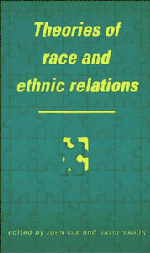Book contents
- Frontmatter
- Contents
- List of contributors
- Preface
- Introduction. Controversies and continuities in race and ethnic relations theory
- 1 Intersecting strands in the theorisation of race and ethnic relations
- 2 Epistemological assumptions in the study of racial differentiation
- 3 The role of class analysis in the study of race relations – a Weberian perspective
- 4 Varieties of Marxist conceptions of ‘race’, class and the state: a critical analysis
- 5 Class concepts, class struggle and racism
- 6 A political analysis of local struggles for racial equality
- 7 Ethnicity and Third World development: political and academic contexts
- 8 Social anthropological models of inter-ethnic relations
- 9 Pluralism, race and ethnicity in selected African countries
- 10 Ethnicity and the boundary process in context
- 11 Ethnicity and the sociobiology debate
- 12 Rational choice theory and the study of race and ethnic relations
- 13 The ‘Chicago School’ of American sociology, symbolic interactionism, and race relations theory
- 14 The operationalisation of identity theory in racial and ethnic relations
- Bibliography
- Index
9 - Pluralism, race and ethnicity in selected African countries
Published online by Cambridge University Press: 01 June 2011
- Frontmatter
- Contents
- List of contributors
- Preface
- Introduction. Controversies and continuities in race and ethnic relations theory
- 1 Intersecting strands in the theorisation of race and ethnic relations
- 2 Epistemological assumptions in the study of racial differentiation
- 3 The role of class analysis in the study of race relations – a Weberian perspective
- 4 Varieties of Marxist conceptions of ‘race’, class and the state: a critical analysis
- 5 Class concepts, class struggle and racism
- 6 A political analysis of local struggles for racial equality
- 7 Ethnicity and Third World development: political and academic contexts
- 8 Social anthropological models of inter-ethnic relations
- 9 Pluralism, race and ethnicity in selected African countries
- 10 Ethnicity and the boundary process in context
- 11 Ethnicity and the sociobiology debate
- 12 Rational choice theory and the study of race and ethnic relations
- 13 The ‘Chicago School’ of American sociology, symbolic interactionism, and race relations theory
- 14 The operationalisation of identity theory in racial and ethnic relations
- Bibliography
- Index
Summary
Introduction
For the most part, in formulating and evaluating ‘theories’ of race and ethnic relations, Western scholars rely disproportionately on descriptive analyses of relevant situations in Western societies provided by other Western scholars, thereby entrenching the myopia and ethnocentric bias from which scholarly studies of these questions have perennially suffered. In an effort to open a small window on the wider world and to persuade colleagues to devote more time to the systematic study of foreign situations, I present here a comparative analysis of data from twenty-seven contemporary African states in an attempt to determine the relative significance of pluralism, race and ethnicity for social order and political stability in these societies. I do so in the belief that better understanding of the ways in which these three sets of variables affect conditions of social order and political stability in the emergent ‘nation-states’ of post-colonial Africa may provide a sound base for general theories of race and ethnicity in modern societies. To that end I shall outline the social bases and developments of these twenty-seven countries up to the end of 1982, as that was the latest date for which such information was readily available at the time of writing.
In this paper I use data drawn from the following states: Algeria, Benin, Cameroon, Cape Verde Islands, Central African Republic, Chad, Equatorial Guinea, Ethiopia, Gabon, Gambia, Ghana, Guinea, Guinea-Bissau, the Ivory Coast, Lesotho, Liberia, Malawi, Mali, Mauritania, Mozambique, Niger, Nigeria, Sāo Tomé and Príncipe, Senegal, Sierra Leone, Togo and Upper Volta.
- Type
- Chapter
- Information
- Theories of Race and Ethnic Relations , pp. 187 - 225Publisher: Cambridge University PressPrint publication year: 1986
- 10
- Cited by



